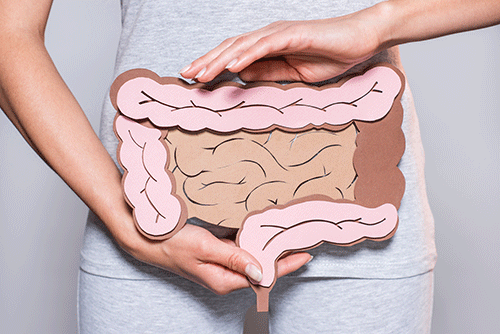Gut health is foundational to your physical and mental well being. Our nutrition experts can help you improve your gastrointestinal health and treat common GI diseases and disorders.

Protecting Your GI Health Starts With Proper Nutrition
The most commonly diagnosed GI diseases or disorders include the following:
IBS (Irritable Bowel Syndrome)
A condition in which the colon muscle frequently contracts or goes into spasm. Symptoms include abdominal pain and cramps, excess gas, bloating, and harder, looser or more urgent stools than normal.
Diverticular Disease
Diverticulosis is the presence of small outpouchings (diverticula) in the wall of the large intestine. Diverticulosis rarely causes symptoms. In about 10% of people with outpouchings, more significant Diverticular Disease develops including infection or inflammation (Diverticulitis), bleeding and obstruction.
Colitis
Conditions that cause an inflammation of the small and/or large intestine. There are several forms or types including Ulcerative Colitis, Crohn’s Disease, Infectious Colitis, Ischemic Colitis and Radiation Colitis. Symptoms include diarrhea, rectal bleeding, abdominal cramps and an urgent need to empty the bowel.
Celiac Disease
A condition involving problems digesting gluten, a protein in foods like bread, crackers and pasta, which then negatively affects the ability to absorb nutrients. Most common symptoms include gas and bloating, weight loss and significant fatigue.
GERD (Gastroesophageal Reflux Disease)
A condition involving severe or chronic acid reflux (heartburn) which occurs when stomach acid splashes up into the esophagus. Acid reflux is typically described as a burning or sharp pain in the middle of the chest that may reach into the throat.
Ulcers
A condition in which holes or breaks develop in the protective lining of the duodenum (the upper part of the small intestine), the stomach or less commonly, the esophagus. When stomach acids and enzymes come into contact with an ulcer, an intense burning pain is experienced.
The gastrointestinal (GI) system consists of a complex relationship among a number of organs including the esophagus, stomach, spleen and pancreas, as well as the small and large intestines. The proper functioning of this system is integral to maintaining your health and well-being through the breakdown and absorption of foundational nutrients and through the elimination of toxins. Many factors can have negative effects on the GI system and can contribute to the onset of GI difficulties. This includes genetic factors, viral and bacterial infections, the effects of medications, development of food allergies and food sensitivities, emotional stress, the effects of toxins and poor diet.
Our nutritional staff approaches GI health holistically with emphasis on the following:
- Identifying the origin or causative factors of the difficulties that you are having, including use of Mediator Release Testing as needed to assess for sensitivities to allergens such as foods and food additives.
- Creation of a plan aimed at repairing and restoring balance in your gastrointestinal system. This plan typically incorporates a combination of dietary changes, use of nutritional supplements and lifestyle modifications.
- Referral to a counselor if needed for assistance with development of improved stress management skills.
